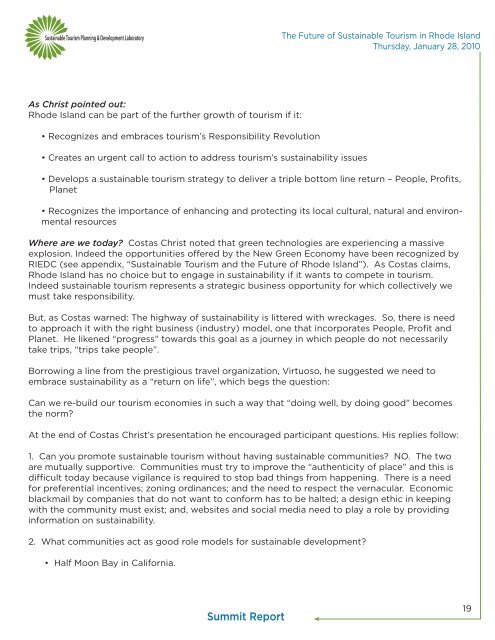Download PDF - Sustainable Tourism Lab
Download PDF - Sustainable Tourism Lab
Download PDF - Sustainable Tourism Lab
You also want an ePaper? Increase the reach of your titles
YUMPU automatically turns print PDFs into web optimized ePapers that Google loves.
The Future of <strong>Sustainable</strong> <strong>Tourism</strong> in Rhode Island<br />
Thursday, January 28, 2010<br />
As Christ pointed out:<br />
Rhode Island can be part of the further growth of tourism if it:<br />
• Recognizes and embraces tourism’s Responsibility Revolution<br />
• Creates an urgent call to action to address tourism’s sustainability issues<br />
• Develops a sustainable tourism strategy to deliver a triple bottom line return – People, Profits,<br />
Planet<br />
• Recognizes the importance of enhancing and protecting its local cultural, natural and environmental<br />
resources<br />
Where are we today? Costas Christ noted that green technologies are experiencing a massive<br />
explosion. Indeed the opportunities offered by the New Green Economy have been recognized by<br />
RIEDC (see appendix, “<strong>Sustainable</strong> <strong>Tourism</strong> and the Future of Rhode Island”). As Costas claims,<br />
Rhode Island has no choice but to engage in sustainability if it wants to compete in tourism.<br />
Indeed sustainable tourism represents a strategic business opportunity for which collectively we<br />
must take responsibility.<br />
But, as Costas warned: The highway of sustainability is littered with wreckages. So, there is need<br />
to approach it with the right business (industry) model, one that incorporates People, Profit and<br />
Planet. He likened “progress” towards this goal as a journey in which people do not necessarily<br />
take trips, “trips take people”.<br />
Borrowing a line from the prestigious travel organization, Virtuoso, he suggested we need to<br />
embrace sustainability as a “return on life”, which begs the question:<br />
Can we re-build our tourism economies in such a way that “doing well, by doing good” becomes<br />
the norm?<br />
At the end of Costas Christ’s presentation he encouraged participant questions. His replies follow:<br />
1. Can you promote sustainable tourism without having sustainable communities? NO. The two<br />
are mutually supportive. Communities must try to improve the “authenticity of place” and this is<br />
difficult today because vigilance is required to stop bad things from happening. There is a need<br />
for preferential incentives; zoning ordinances; and the need to respect the vernacular. Economic<br />
blackmail by companies that do not want to conform has to be halted; a design ethic in keeping<br />
with the community must exist; and, websites and social media need to play a role by providing<br />
information on sustainability.<br />
2. What communities act as good role models for sustainable development?<br />
• Half Moon Bay in California.<br />
Summit Report<br />
19





